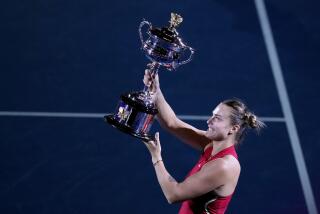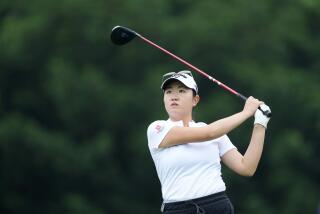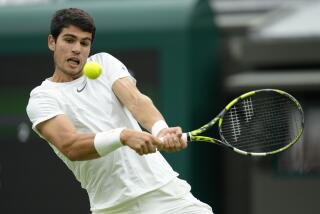No. 1 Ivanovic is upset at Wimbledon
- Share via
With more and more countries thriving at sports, this would be the volatile Wimbledon in which the No. 154 female player in the world beat the No. 2 player on one day and then the No. 133 player beat the No. 1 player the next.
It’s the Wimbledon that already cemented Russia as a mastodon with nine of the final 32 women -- “We are very tough,” Svetlana Kuznetsova said -- and it’s the Wimbledon that lent a fresh peek at the gathering colossus of China.
Peng Shuai, once 31st in the world but now 54th, made the final 32, but even that heady showing paled next to Zheng Jie, once 27th in the world but now 133rd.
Zheng, a 2006 Wimbledon champion in doubles, on Friday became the first Asian ever to defeat a No. 1 player in singles with her methodical 6-1, 6-4 upset of Ana Ivanovic, and the thing about that match was that if you dropped in from Mars and watched, you might wonder which player was No. 133 and which No. 1.
“In China is no grass court,” Zheng said, “but every time I play the grass court I feel is perfect one.”
From Virginia Wade on the BBC telecast to Ivanovic and Zheng in their post-match interviews, people seemed to agree that the 5-foot-4 Zheng benefited from her height -- or lack of it -- as her low center of gravity helped unleash low-bouncing shots that the 6-foot-1 Ivanovic could not handle.
Zheng herself said she amassed confidence partly through watching Ivanovic, the French Open champion, slog it out with 97th-ranked Nathalie Dechy of France in a second round in which Dechy held two match points.
And as cagey 28-year-old pro Amelie Mauresmo said of all these upsets at Wimbledon, “We can feel it for a while now. It’s still improving. Yeah, all the players are capable of beating top players.”
One day after 20-year-old, 154th-ranked Alla Kudryavtseva shredded third-seeded Maria Sharapova on Court No. 1, the 25-year-old Zheng took the same court to dredge tears from Ivanovic and remind anyone it’s a China year in sports.
Even the majesty of Wimbledon, into which Zheng received a wild card after some injury trouble, serves as only a precursor for the Beijing Olympics in her case.
“Maybe this is my last tournament before the Olympics,” Zheng said. “After this I need to go back to the Beijing for be ready to play the Olympics because, you know, we want to try the best in Olympics.”
As a side note to that, the Russian-Chinese influence has cracked open this Wimbledon draw, which grows ever more mysterious save for the familiar and durable double-Williams presence. Because a 20-year-old Russian could beat Sharapova and a Chinese player could beat Ivanovic, there’s no telling who might wind up a semifinalist, with the fresh hopefuls including the 18-year-old Belorussian and the onrushing 19-year-old Hungarian Agnes Szavay.
A horde of women clearly see an opening, as when Kudryavtseva sensed Sharapova vulnerable during warmups and Zheng said of Ivanovic, “I feel today sometime she serve is no good. I feel she serve today was just so-so. That give me a chance to play more aggressive.”
The easy ability to read Ivanovic’s serve, in turn, epitomized the precarious nature of No. 1 since Justine Henin suddenly retired and since depth started taking hold. “You know, sometimes you’re tired, emotional tired,” Ivanovic said, “but you don’t realize why. So it’s important also to take time and let it sink in a little bit and set your goals again.”
In a globalized world of capable Russians and Eastern Europeans and Chinese, those types of goals can grow ever more thorny.
More to Read
Go beyond the scoreboard
Get the latest on L.A.'s teams in the daily Sports Report newsletter.
You may occasionally receive promotional content from the Los Angeles Times.










